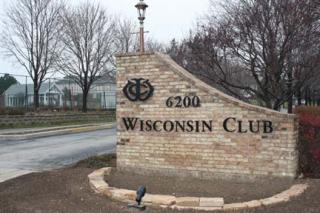The merger of Brynwood Country Club — the longtime social center for much of Milwaukee’s affluent Jewish community — with the Wisconsin Club was necessary but not easy.
Golf courses and country clubs around the country are hurting. Changing lifestyles and tough economic times have delivered a double whammy that has forced many to consider their options.
Alan Marcuvitz, a Milwaukee real estate lawyer who has special expertise in golf courses, said there are probably 20 or 30 clubs around the country interested in similar mergers.
Marcuvitz, a Brynwood member, said there was little opposition to the merger.
“Brynwood’s membership was too small to sustain the country club at a fair level of cost,” Marcuvitz said. “They were borrowing against their equity to stay afloat.”
The city assessor put the fair market value of the club at just under $5.6 million and the tax bill for this year is $127,333 or $14,348 a month.
Brynwood, located at 6200 W. Good Hope Rd., was founded in 1929 at a time when the Jewish community was barred from many other social clubs here and elsewhere. The 6,700-yard, 18-hole golf course was long considered one of the best in the area; the tennis, pool and fitness facilities were comparable and the food was divine.
Michael Mervis, a spokesman for the Brynwood board of directors, noted that the country club also boasted an amateur theatre group.
“There are pictures of performances going back years and years,” Mervis said.
Three years ago, the club began merger negotiations with the Wisconsin Club, located at 900 W. Wisconsin Ave. in the shadow of the Milwaukee County Courthouse. Those involved in the negotiations are mum about what cut off the discussions back then but the talks were restarted about six months ago.
After that first attempt, Brynwood turned to the Marcus Corporation, which took over management of the club from October 2006 until the merger, which took effect Nov. 1.
John Constantine, the general manager of the Wisconsin Club, said the agreement is a lease with an option to buy.
Separate from the lease agreement, Brynwood is selling a two-acre corner lot.
“This is a win-win situation,” said Constantine. “Alliances like this one are what clubs all over the country are looking at in order to survive. Right now we are one of two in the U.S. with this kind of arrangement.”
The Milwaukee Yacht Club and the University Club are discussing a similar merger.
Members of Brynwood and the Wisconsin Clubs will have full access to both facilities.
Membership in both clubs is $5,500 with no initiation fee and no minimum spending requirement.
In the first 10 days of the partnership, 100 new members for the country club were recruited, Constantine said, adding that he had booked 25 banquets for the Brynwood facility in the same period.
Constantine said the Wisconsin Club had 375 members when he became general manager 20 years ago. Now it has 1,300 members.
“We did a $16 million renovation and never had to assess the members,” Constantine said. “The club is debt free.”
The Business Journal of Milwaukee reported that the club plans a $400,000 renovation of the former Brynwood’s entire first floor, including its ballroom and formal dining room.
Jonathan D. Sarna, a professor of Jewish Studies at Brandeis University, said at least one other traditionally Jewish club has closed in recent years and that others may be in danger.
“Once Jews gained admission into general country clubs, Jewish country clubs began to decline,” Sarna said in an e-mail from Jerusalem where he is on sabbatical.
“They had been created in response to social discrimination — an era when Jews created a kind of parallel universe to non-Jewish institutions that excluded them — and now the era of discrimination has ended.
“Nor is it clear that Jews feel the same need to golf or do gym with people of their own faith, the way they once did,” he continued. “Everywhere we see Jews joining local gyms and golf clubs, sometimes at the expense of Jewish ones or of the JCC. Convenience, in other words, tends to trump Jewish communal ties.”
Brynwood has not been exclusively Jewish for many years, said Marcuvitz.
Joel Lee, a longtime Brynwood member, said part of the country club’s declining membership is attributable to the movement of much of the Jewish community to Mequon and other parts of the North Shore.
“Kids used to bike the country club,” Lee said. “They can’t do that anymore.”
School-age children also have many more options than in years past and parents are cutting corners wherever possible because of the economy.
“People just don’t build their lives around the country club any more,” Lee said.
Ollie Adelman, a longtime member and former president of Brynwood, said many potential members only spend half their time in Wisconsin, seeking warmer climates during the winter.
When Adelman was president of the club in 1954, the club had 254 members and a short waiting list.
“Belonging to a country club was kind of a classy thing,” Adelman said. “For a long time you couldn’t belong to most clubs if you were Jewish. When that ended, Brynwood started losing five members one year, 15 another year and so on.”
Marcuvitz said he is happy with the arrangement with the Wisconsin Club.
“My wife and I went to dinner there the other night,” Marcuvitz said. “It’s beautiful. A minor advantage is that it’s right across from the courthouse and I won’t have to look for parking when I have to go downtown.”


